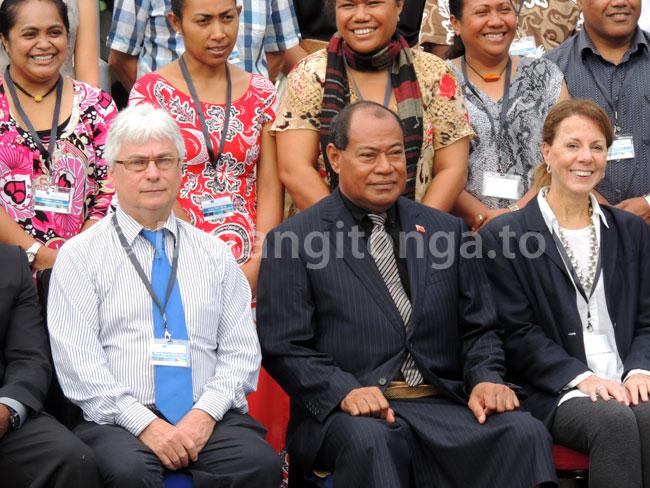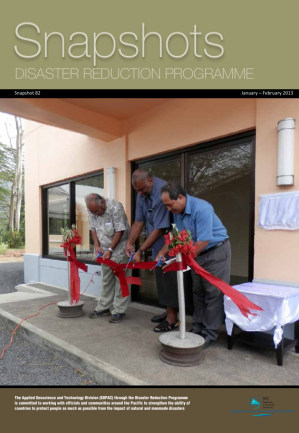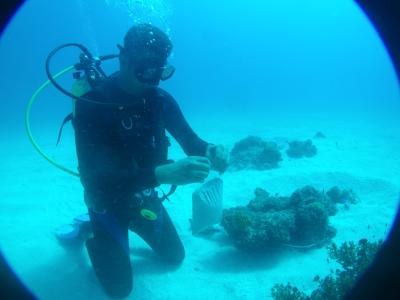Pacific Islands need robust laws to protect their deep sea minerals
Tuesday, 12 March 2013 16:17
administrator
Source: Matangi Tonga Online. Republished With Editor's Permission.

The Pacific Islands need to protect their deep sea minerals, Tonga's Deputy Prime Minister Hon. Samiu Vaipulu told a Pacific-ACP States Regional Workshop on Deep Sea Minerals Law and Contract Negotiations that opened at the Fa'onelua Convention Centre, in Nuku'alofa today on March 11.
Representatives of 15 Pacific States are attending the week-long workshop.
Mike Petterson the Director of SOPAC, the Applied Geoscience and Technology Division of the Secretariat of the Pacific Community (SPC), said today that the workshop will focus on the legislative and regulatory aspects of deep sea minerals.
He said the workshop is aimed at sharing information on a number of developments that SOPAC is working on, including developing legislation for the extraction of deep sea minerals. "What we want achieve is largely capacity building, as like any other economic activity, Pacific states are a little bit compromised by multinational and well-resourced companies coming in," he said.
"We need to know how to negotiate and drive a hard deal. We have to prepare ourselves as best we can by developing our negotiating skills, along with a network of people that we trust and know, and to work with industries and countries that we feel that will be responsible and want a long-term working relationship, and for our communities to benefit while the environment is protected as best we can."
Mike said some Pacific Island countries already had legislation for deep sea minerals. But it was a new thing for the Pacific Islanders to consider who has the rights to the minerals, who gains from it and how can we put in place a transparent system, while looking at the environmental issues, he said.
He said for decades the main issue had been the lack of knowledge as to where minerals are, what type of minerals are out there, as there are many deposits to discover in the ocean.
"But we are now at a point where there are few areas in the Pacific that have been identified to be attractive and that's a breakthrough. Now it is becoming an economic reality and to make sure that countries maximize the benefits, which is never easy and requires hard work so we want representatives to walk away armed with more knowledge and be aware of the range of issues we have to cope with," he said.
Last Updated on Monday, 18 March 2013 16:09
Read more...
Snapshots 82 - Disaster Reduction Programe - January to February, 2013
Thursday, 07 March 2013 11:33
administrator

Welcome to the first edition of Snapshots for 2013!
It's taken us a while but we've finally been able to get something together to give you some understanding of the work being undertaken by the SPC/SOPAC Disaster Reduction Programme. These are just tidbits of a wider range of initiatives, the developments of which, we hope to share with our readers over the course of 2013.
The year has gotten off to a bang but unfortunately not the kind that we would have wanted. The disasters that affected both Samoa and Fiji as a result of Tropical Cyclone Evan in December required some immediate attention early in January. Through a collaborative effort with the SPC/SOPAC Water and Sanitation Programme, we deployed two staff to assist Samoa's post disaster needs assessment . In February, we provided similar assistance to Fiji (just coming to completion as this goes to print so watch this space for news on the Fiji post disaster needs assessment). We also, per the tireless contribution of Litea Biukoto, were able to support post disaster assessment work in the Solomon Islands which was impacted by an earthquake and tsunami in early February.
So, there's been no let up this - made even more interesting since other activities continue as scheduled. Alas, such is the life of those of us in this line of work. We have a number of interesting stories in this edition. The Pacific Disaster Net has reached a significant milestone; our work in French Polynesia is making significant progress; the B Envelope project continues to add another success to its portfolio of activities, and more.
I hope you enjoy reading our stories and please 'stay tuned' for more as we progress in the coming months.
Download Full Issue
Mosese Sikivou
Deputy Directory, Disaster Reduction Programme
Last Updated on Thursday, 07 March 2013 11:38
New Zealand Funding Agreement for Marine Geoscience Services by Oceans and Islands Programme
Wednesday, 27 February 2013 10:54
administrator

H.E. Linda Te Puni, New Zealand Consul General in New Caledonia, and Dr Jimmie Rodgers, Director-General of SPC, have signed a new grant funding agreement totaling NZD 6.1 million.
The funding consists of New Zealand’s annual contribution (approximately half of the total) and a grant for regional services in the areas of Oceanic Fisheries, Coastal Fisheries, Land Resources, Statistics, Ocean and Islands (geoscience), and Public Health. Details are below.
Membership assessed contribution NZD 3,045,000 and Purchase of regional services NZD 3,055,000 – broken down as follows:
| Oceanic Fisheries NZD |
NZD 430,000 |
| Coastal Fisheries |
NZD 310,000 |
| Centre for Pacific Crops and Trees |
NZD 245,000 |
| Para-veterinary training |
NZD 245,000 |
| Statistics for Development |
NZD 300,000 |
| Ocean and Islands (geoscience) |
NZD 1,025,000 |
| Public Health |
NZD 500,000 |
Ms Te Puni stated that all of the programmes supported by New Zealand in 2013 address issues that are central to the development of the Pacific region, and that the funding demonstrates New Zealand’s commitment to contributing to the Pacific region’s development agenda through its bilateral and targeted regional assistance.
Last Updated on Wednesday, 27 February 2013 11:15
Read more...
New Director For SOPAC/SPC Division
Wednesday, 06 February 2013 11:20
administrator

Prof. Michael Petterson has taken up his appointment as Director of the Secretariat of the Pacific Community (SPC) Applied Geoscience and Technology Division (SOPAC) succeeding Dr Russell Howorth, whose tenure with the organization officially ended on 31st January 2013
Before taking up this position with SPC, Prof. Petterson, who is from the United Kingdom, held a Professorship of Applied and Environmental Geosciences at the University of Leicester, from 2009, before which he was Director of Science, Skills and Facilities at the British Geological Survey for five years.
Holding a PhD in geology (1984) and a post graduate certificate in education (1985), Prof. Petterson is a chartered geologist, a chartered engineer, Fellow of the Geological Society of London, Member of the Institute of Materials, Mining and Metallurgy, life member of the Association of Geoscientists for International Development, Member of the Society of Economic Geologists, and he is a member of the STAR network.
Last Updated on Wednesday, 06 February 2013 11:35
Read more...
|
Pacific officials preparing for seabed mining negotiations
Thursday, 07 March 2013 11:45
administrator

For the developing economies of the Pacific the prospect of untold mineral wealth being mined from under the sea is an enticing one.
Already Papua New Guinea has approved the first deep sea mining project in the region, and prospecting surveys have been carried off the coasts of several other countries.
Allied to that officials from around the Pacific will meet in Tonga next week to learn how to get the best deals from companies offering to mine within their exclusive economic zones.
Dr Mike Petterson, the Director of SOPAC, the Applied Geoscience and Technology Division of the Secretariat of the South Pacific Community says the aim is to make sure countries are well prepared to handle negotiations with the big mining companies.
Listen to full interview (8.17 min)
Source: ABC Radio Australia - Link
Speaker: Prof. Mike Petterson, Director, SOPAC Geoscience and Technology (SOPAC), Secretariat of the Pacific Community, SPC.
Last Updated on Thursday, 07 March 2013 12:01
Kingdom of Tonga to Host Regional Workshop on Law and Contract Negotiations for Deep Sea Minerals in the Pacific (March 11-15, 2013)
Tuesday, 05 March 2013 11:42
administrator
 From March 11-15th 2013, the Kingdom of Tonga is to host a regional workshop on “Law and Contract Negotiations for Deep Sea Minerals” in Nuku’alofa, on behalf of the SPC-EU Pacific Deep Sea Minerals Project. From March 11-15th 2013, the Kingdom of Tonga is to host a regional workshop on “Law and Contract Negotiations for Deep Sea Minerals” in Nuku’alofa, on behalf of the SPC-EU Pacific Deep Sea Minerals Project.
The Pacific Deep Sea Minerals Project is funded by the European Union and managed by SOPAC, the Applied Geoscience & Technology Division of the Secretariat of the Pacific Community. The project includes 15 Pacific Island Countries: the Cook Islands, Federated States of Micronesia, Fiji, Kiribati, Marshall Islands, Nauru, Niue, Palau, Papua New Guinea, Samoa, Solomon Islands, Timor Leste, Tonga, Tuvalu and Vanuatu.
Hannah Lily, Legal Adviser for the Pacific Deep Sea Minerals Project, says a main objective of the Tonga workshop is to provide government officials with the knowledge, skills and confidence to negotiate effectively with well-resourced deep sea mining companies. Ms. Lily says the Project stresses the importance for countries to put in place robust law and regulatory mechanisms for the national management of deep sea minerals before any negotiations take place.
“We strongly recommend that countries have these mechanisms in place before any individual project negotiations commence. Dedicated seabed minerals legislation will assist the country to meet its obligations under international law, such as the protection of the marine environment. It will also provide clarity and stability to that country’s operating environment and what it expects from mineral companies.”
“Seabed mineral resources represent an exciting new economic opportunity for Pacific Island States. But, in order to make the most of this opportunity, governments will need to find responsible exploration and mining companies, and work to set terms that provide sufficient protection and financial return to the country,” she says.
Last Updated on Tuesday, 05 March 2013 11:46
Read more...
2013 Pacific GIS/RS User Conference Announced
Wednesday, 13 February 2013 11:09
administrator

After last year's conference's resounding success, the Pacific Islands GIS/RS (Geographical Information Systems and Remote Sensing) conference committee is pleased to announce that this year's conference will be held on the 25th - 29th November, 2013.
The 2013 Conference theme is "Connecting the Pacific with Maps". The venue is yet to be finalized.
More details will soon be made available on the conference website picgisrs.appspot.com
Last Updated on Wednesday, 13 February 2013 11:14
Pacific Catastrophe Risk Insurance Pilot Launched
Friday, 01 February 2013 11:27
administrator

Pilot program to help governments respond to natural disasters
The Marshall Islands, Samoa, Solomon Islands, Tonga and Vanuatu are all part of a pilot catastrophe risk insurance programme launched on January 17, 2013 to provide their governments with immediate funding if a major (natural) disaster occurs.
Japan, the World Bank and the Secretariat of the Pacific Community (SPC) have teamed up with the 5 Pacific Island Countries to launch the Pacific Catastrophe Risk Insurance Pilot. It will test whether a risk transfer arrangement modelled on an insurance plan can help Pacific island nations deal with the immediate financial effects of disasters.
The pilot relies on state-of-the-art financial risk modelling techniques and is the first ever Pacific scheme to use parametric triggers, linking immediate post-disaster insurance payouts to specific hazard events. This joint effort will allow Pacific island nations to access earthquake and tropical cyclone catastrophe coverage from reinsurance companies at an attractive price.
Last Updated on Wednesday, 06 February 2013 11:31
Read more...
|









 From March 11-15th 2013, the Kingdom of Tonga is to host a regional workshop on “Law and Contract Negotiations for Deep Sea Minerals” in Nuku’alofa, on behalf of the SPC-EU Pacific Deep Sea Minerals Project.
From March 11-15th 2013, the Kingdom of Tonga is to host a regional workshop on “Law and Contract Negotiations for Deep Sea Minerals” in Nuku’alofa, on behalf of the SPC-EU Pacific Deep Sea Minerals Project. 









